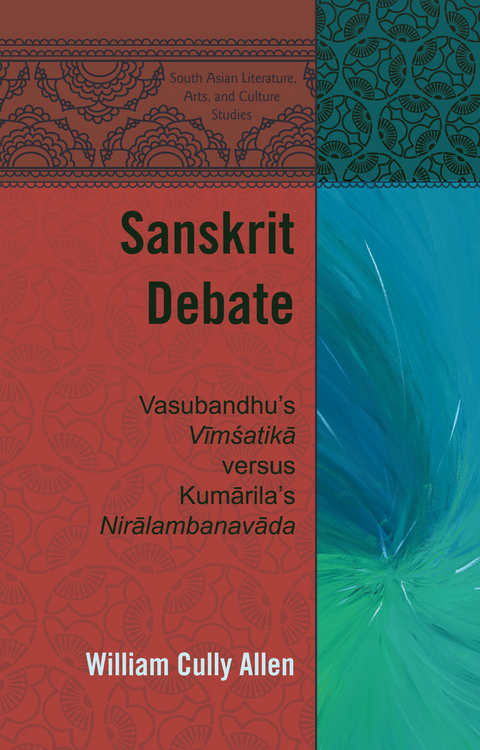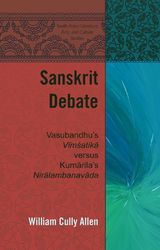Sanskrit Debate
Vasubandhu’s "Vīmśatikā" versus Kumārila’s "Nirālambanavāda"
Seiten
2014
|
New edition
Peter Lang Publishing Inc (Verlag)
978-1-4331-1758-9 (ISBN)
Peter Lang Publishing Inc (Verlag)
978-1-4331-1758-9 (ISBN)
Sanskrit Debate: Vasubandhu’s ‘Vīmśatikā’ versus Kumārila’s ‘Nirālambanavāda’ illustrates the rules and regulations of classical Indian debate literature (pramānaśāstra) by introducing new translations of two Sanskrit texts composed in antithesis to each other’s tradition of thought and practice. In the third century CE, Vasubandhu, a Buddhist philosopher-monk, proposed that the entire world of lived experience is a matter of mind only through his Vīmśatikā (Twenty Verses). In the seventh century CE, Kumārila, a Hindu philosopher-priest, composed Nirālambanavāda (Non-Sensory Limit Debate) to establish the objective reality of objects by refuting Vasubandhu’s claim that objects experienced in waking life are not different from objects experienced in dreams. Kumārila rigorously employs formal rules and regulations of Indian logic and debate to demonstrate that Vasubandhu’s assertion is totally irrational and incoherent.
Vīmśatikā ranks among the world’s most misunderstood texts but Kumārila’s historic refutation allows Vīmśatikā to be read in its own text-historical context. This compelling, radically revolutionary re-reading of Vīmśatikā delineates a hermeneutic of humor indispensable to discerning its medicinal message. In Vīmśatikā, Vasubandhu employs the form of professional Sanskrit logic and debate as a guise and a ruse to ridicule the entire enterprise of Indian philosophy. Vasubandhu critiques all Indian theories of epistemology and ontology and claims that both how we know and what we know are acts of the imagination.
Vīmśatikā ranks among the world’s most misunderstood texts but Kumārila’s historic refutation allows Vīmśatikā to be read in its own text-historical context. This compelling, radically revolutionary re-reading of Vīmśatikā delineates a hermeneutic of humor indispensable to discerning its medicinal message. In Vīmśatikā, Vasubandhu employs the form of professional Sanskrit logic and debate as a guise and a ruse to ridicule the entire enterprise of Indian philosophy. Vasubandhu critiques all Indian theories of epistemology and ontology and claims that both how we know and what we know are acts of the imagination.
William Cully Allen studied Sanskrit at Harvard University, The University of Pennsylvania, and Banaras Hindu University before earning his PhD in South Asian religion at Temple University. Allen has taught for twenty-five years at Temple University, Austin College, Bucknell University, Muhlenberg College, and the University of the Arts.
Contents: Classical Indian Philosophy – Vimśatikā and Auto-Commentary in Text-Historical Context – Translation of Vimśatikā and Auto-Commentary – Nirālambanavāda in Text–Historical Context – Translation of Nirālambanavāda – The Verdict.
| Erscheint lt. Verlag | 30.12.2014 |
|---|---|
| Reihe/Serie | South Asian Literature, Arts, and Culture Studies ; 2 | South Asian Literature, Arts, and Culture Studies ; 2 |
| Mitarbeit |
Herausgeber (Serie): Moumin Quazi |
| Verlagsort | New York |
| Sprache | englisch |
| Maße | 150 x 225 mm |
| Gewicht | 340 g |
| Themenwelt | Geisteswissenschaften ► Philosophie ► Allgemeines / Lexika |
| Geisteswissenschaften ► Philosophie ► Erkenntnistheorie / Wissenschaftstheorie | |
| Geisteswissenschaften ► Philosophie ► Geschichte der Philosophie | |
| Geisteswissenschaften ► Philosophie ► Logik | |
| Geisteswissenschaften ► Philosophie ► Östliche Philosophie | |
| Geisteswissenschaften ► Philosophie ► Philosophie der Neuzeit | |
| Geisteswissenschaften ► Religion / Theologie ► Buddhismus | |
| Geisteswissenschaften ► Religion / Theologie ► Hinduismus | |
| ISBN-10 | 1-4331-1758-4 / 1433117584 |
| ISBN-13 | 978-1-4331-1758-9 / 9781433117589 |
| Zustand | Neuware |
| Haben Sie eine Frage zum Produkt? |
Mehr entdecken
aus dem Bereich
aus dem Bereich
die letzten Jahre der Philosophie und der Beginn einer neuen …
Buch | Hardcover (2024)
Klett-Cotta (Verlag)
28,00 €
Gesundheitsschutz, Selbstbestimmungsrechte, Rechtspolitik
Buch | Softcover (2024)
Kohlhammer (Verlag)
39,00 €
Jenseits von Identität | Ausgezeichnet mit dem Leipziger Buchpreis …
Buch | Softcover (2023)
Ullstein Taschenbuch Verlag
13,99 €




